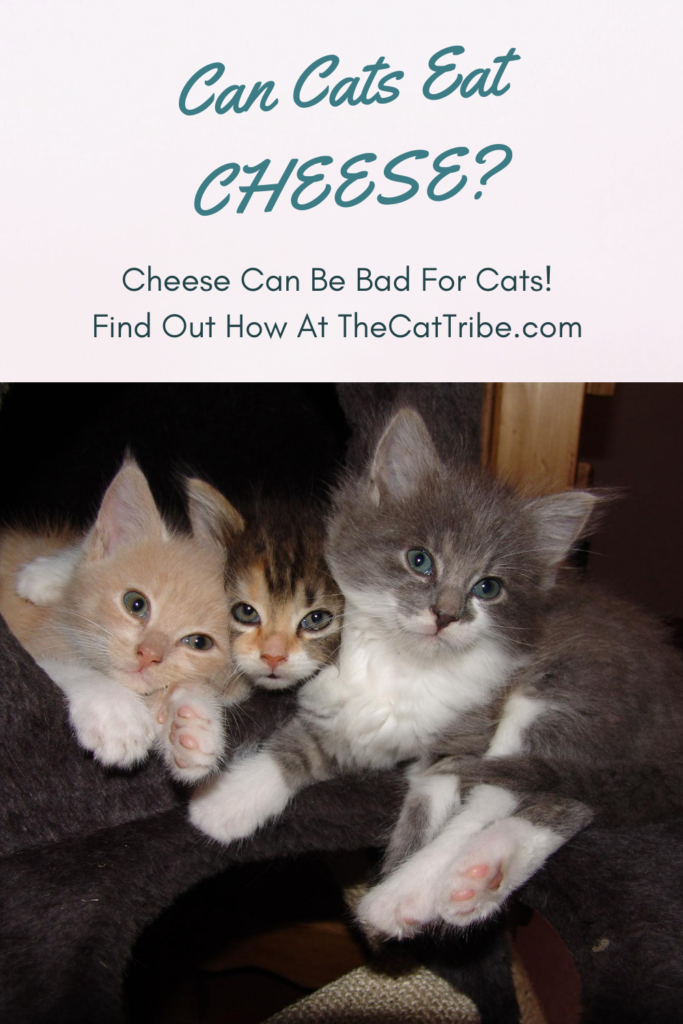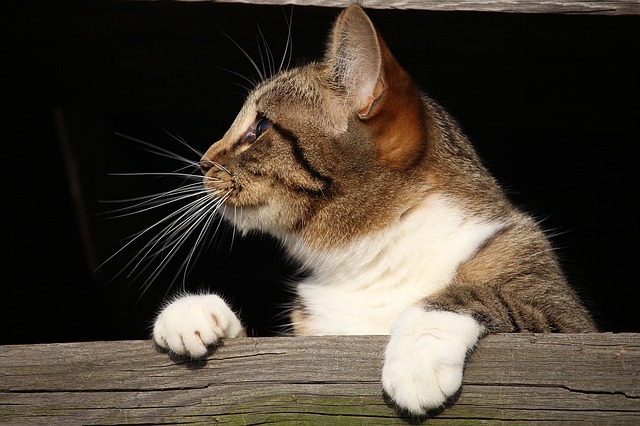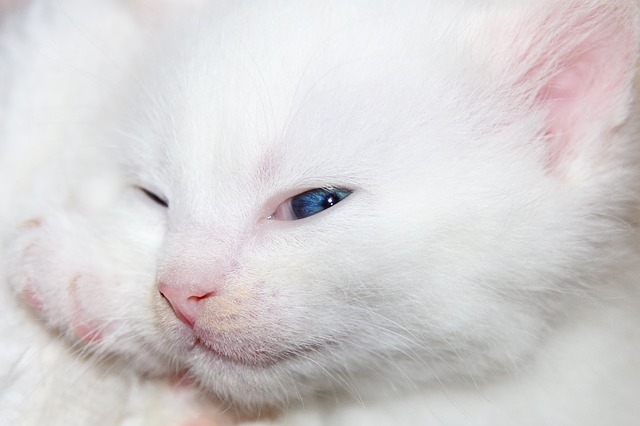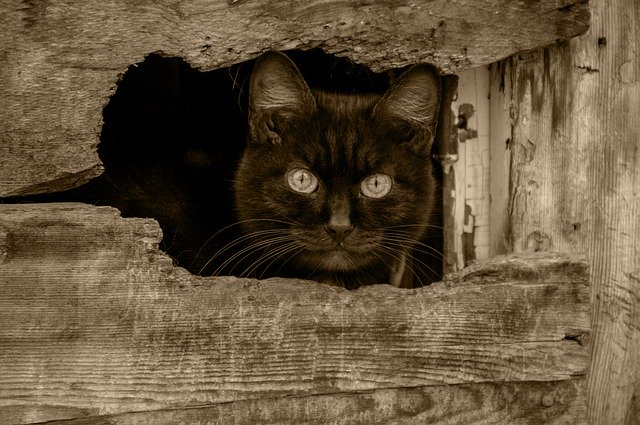Can cats eat cheese? Have you ever asked yourself this question?
I remember when I was a kid, I used to watch “Garfield” and “Tom and Jerry.” As you might also remember, Garfield always goes crazy for a bite of lasagne, or Tom and Jerry fight over a bowl of milk to drink it.
I’ve grown up seeing fluffy felines enjoying dairy in their diet. But can cats eat cheese for real? Or, more precisely, should you be feeding your cat cheese?
Also, we all know that cats adore milk, of course not because milk contains calcium; it’s just because milk is rich in fats and cream, and that is their delightful weakness.
As we read more about the digestion of our fluffy friends, it has become clear to all cat owners that, while they may appreciate a bowl of milk or a slice of cheese, they’re not intended to feast on dairy as their natural food.
In today’s article, we’ll break one of the most common feline questions and explain all there is to know about feeding your cat cheese.

Table of Contents
Can Cats Eat Cheese? The Answer!
If you are looking for a short answer to the question, can cats eat cheese? According to some experts, Yes! — but only in moderation. However, other experts say No! But why is there a controversial answer to this question?
When you think of it, cats love milk, and accordingly, you must be thinking that it is fine to feed them dairy products such as cheese. But, can cats eat cheese for real?
However, the ugly truth is that cheese can harm your cat badly if you don’t know enough information about it and how to feed your cat cheese properly. Therefore we will discuss now why cheese can harm your cat.


Why Is Cheese Dangerous For Your Cat?
If you visit Cummings Veterinary Medical Center at Tufts University, they explain to you that cats with heart conditions and/or cats need lower salt intake for precise conditions such as feline hypertension should avoid eating cheese.
In addition to cheese, if your cat is on a special low-sodium diet, they should unquestionably stay away from fast food, potato chips, bread, and deli meat.
Although many cats can tolerate eating cheese, you must make sure that your kitty isn’t lactose intolerant or has a milk allergy. Even a little amount of cheese could severely damage their digestive system.
Unlike humans and some other animals, cats can’t produce the lactase enzyme. Lactase is like any other enzyme that is needed for the body for a specific function. So for lactase, it is essential to break down lactose and other nutrients from dairy products. Unfortunately, cats don’t have these enzymes. And that’s why most cats have difficulty processing dairy products, and most cats are lactose intolerant.
“Cats have it all: admiration, an endless sleep, and company only when they want it.” –Rod McKuen
Can Cats Eat Dairy-Free Cheeses?
You might now shift your question from can cats eat cheese to can cats eat dairy-free cheeses.
Although these days, our technology and knowledge are advanced enough to produce lactose-free food, cats still can’t eat them as they are rich in salt and fat, which can cause different health issues such as feline hypertension, obesity in cats, extreme thirst, lethargy, and vomiting.

Is Cheese Poisonous To Your Cat?
Although dairy products like cheese are rich in harmful ingredients such as salt and fat, cheese is not toxic yo your cat if it is given in small quantities (the secret is in moderation).
Therefore, including cheese to your cat’s diet in moderation can both satisfy your cat and avoid unnecessary side effects. However, make sure to avoid giving your cat cheese regularly.
But, Can Kittens Eat Cheese?
If the answer to today’s question, “can cats eat cheese?” was controversial, then the answer to this question is obvious. You might think that kittens can digest cheese because their main diet is milk from their mother; I suppose you might be wrong.
Kittens can indeed produce a more significant amount of lactase enzyme compared to older cats. But the fact is that they don’t produce enough enzymes to feed them cheese freely. Also, the enzyme production slows down as soon as the weaning starts.
So, by the time your kitty can eat solid food without any risk, their ability to digest dairy is long gone, and above all, kittens still need special dietary requirements.

Types Of Cheese That Your Cat Should Avoid Completely
According to Dr. Werber, he says that the mildest cheeses are the better for your cat. Also, it would be best if you avoided rich cheeses as they contain more harmful ingredients and more complicated for your cat’s stomach to digest.
Another piece of advice is about “Quantity.” Quantity is also important because you can give your cat only a small amount of cheese and not regularly.
But, are there types of cheeses you shouldn’t share with your cat at all? In addition to the preferences mentioned above, you should also avoid feeding your cat “blue Cheese.”
On the other hand, you can still feed your cat as “treats” Cheddar cheese as it is known to contain less lactose, and it is soft in texture, which makes it an excellent choice for a treat.


What Should I Do If My Cat Eats “TOO MUCH” Cheese?
Because the digestive system isn’t evolved enough to breakdown cheese properly. Overeating cheese is not optimal for your cat’s body. Therefore, some dairy Intolerance and dairy Allergy symptoms in cats may appear, such as vomiting, diarrhea, skin patches, itches, or gasses.
Some cats may also experience dietary problems such as being overweight or obese, high blood pressure, heart diseases, high cholesterol, or diabetes.
If you notice any of these symptoms, make sure to provide your cat with fresh water multiple times to flush the extra cheese inside his digestive system.
Symptoms will subside once your cat’s body gets rid of the excess cheese inside of it. But if these symptoms stay for a prolonged time, contact your veterinarian immediately.
There are also some natural treatments for digestive problems that might help your cat if the condition is prolonged and needs further treatment. Either way, it is best to consult your vet about your cat’s condition and the best treatment for your cat.
Grab Your Gift From Our Freebies Page! Click Here
Prevention From Overeating Cheese’s Symptoms
When we started this article, it was to answer a simple question, and that is, can cats eat cheese? However, more details came up, and it is clear now that too much cheese is a problem for your cat or even kitty!
Indeed you can still feed your cat cheese as treats, but you should be aware not to feed your cat too much! Believe it is tempting to do so while watching your cute cat enjoying the treats.
Remember, providing your cat with a healthy diet is essential to avoid different health issues and diseases like heart problems, diabetes, hypertension, or other digestive related conditions. So, to keep your cat healthy and happy, keep its diet healthy, simple as that.

What Do You Think? Are You Willing To Feed Your Cat Cheese?
Unmistakably, cheese is not toxic for your cat, which means the answer to today’s question is a big yes, but as we explained, it will be a no if you plan on feeding your cat too much cheese or a bad quality one. Cats can eat cheese, but try to avoid feeding your cats as much as you can simply because there are no direct dietary benefits.
Providing your cat with a healthy diet is vital, as we noticed from this article and previous ones. You might think of different food we eat as healthy food, but in fact, it can be a toxic or problem for your cat. So, whether you have you want to eat a green apple or cheese, always seek information about it before feeding your cat.
Another tip for you as a cat owner, always to ask your vet before giving your cat food or medication, even natural remedies. After all, they know better than you about your cat.
Finally, I hope you found this article useful and informative enough to answer the question, can cats eat cheese?
Let me know your answer down below. Do you have more information about cheese for cats?
Also, If you have any other questions or different opinions about it, leave a comment below.
?? Enjoyed Reading This Article About Cheese And Cats?
Don’t Forget To Follow Us On Our Social Channels. View Here
